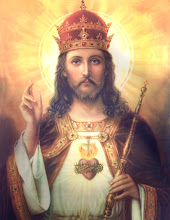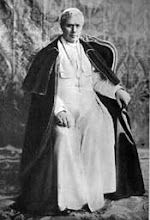
De uma das melhores editoras de livros católicos tradicionais deste mundo e arredores - a Tan Books -, acabei de receber, "Tradition and the Church", de Monsenhor George Agius (também disponível na Amazon). A seu tempo, darei mais aprofundadamente conta do teor deste livro n"A Casa de Sarto". Por ora, para satisfazer a curiosidade dos meus leitores, aqui fica a apresentação que a editora dele faz:
"Scripture and Tradition are the two sources of the Catholic Faith. Everyone knows what Scripture is, but what exactly is Tradition? (...) Based on Church's constant teaching, "Tradition and the Church" answers the question, and thereby satisfies a great need.Written by a priest from Malta with two doctoral degrees, who was incardinated in the Lincoln, Nebraska, diocese, and first published in 1928, this book exposes all aspects of Tradition, so that once a person has read it, he will never again question the nature of Tradition and will have a healthy respect for what has come down to us from the Apostles. The author admits that he wrote his book as a "bridge" to "span the chasm" that has developed between modern man's current religious thinking and the Living Christian Tradition that was handed down by Jesus Christ through the Apostles and the Catholic Church. Thus, "Tradition and the Church" becomes a wonderful aid for those Christians separated from the Catholic Church, that they may see where their spiritual allegiance should be.
Making many important distinctions, Msgr. Agius explains the relationship of Tradition to Sacred Scriptures, the means by which Tradition is safely transmitted, the reasons for the incorruption of Catholic Tradition, the bases of the Church's dogmatic definitions, the authority and dominant role of the Fathers of the Church regarding what is included in Tradition, the necessity of Apostolic Sucession, the inabilityof the Protestant system to maintain Christian teaching in its purity, and many other points. The author also shows Tradition precedes Scripture - both historically and theologically - that the early Church was inexorably hostile to new doctrines, that modern "religious unity" can be a temptation against Catholic faith, and that Divine Revelation was complete with the death of the Apostles and is now closed forever - excluding the possibility that a new church or a newer testament will ever be revealed by God to man".
JSarto
"Scripture and Tradition are the two sources of the Catholic Faith. Everyone knows what Scripture is, but what exactly is Tradition? (...) Based on Church's constant teaching, "Tradition and the Church" answers the question, and thereby satisfies a great need.Written by a priest from Malta with two doctoral degrees, who was incardinated in the Lincoln, Nebraska, diocese, and first published in 1928, this book exposes all aspects of Tradition, so that once a person has read it, he will never again question the nature of Tradition and will have a healthy respect for what has come down to us from the Apostles. The author admits that he wrote his book as a "bridge" to "span the chasm" that has developed between modern man's current religious thinking and the Living Christian Tradition that was handed down by Jesus Christ through the Apostles and the Catholic Church. Thus, "Tradition and the Church" becomes a wonderful aid for those Christians separated from the Catholic Church, that they may see where their spiritual allegiance should be.
Making many important distinctions, Msgr. Agius explains the relationship of Tradition to Sacred Scriptures, the means by which Tradition is safely transmitted, the reasons for the incorruption of Catholic Tradition, the bases of the Church's dogmatic definitions, the authority and dominant role of the Fathers of the Church regarding what is included in Tradition, the necessity of Apostolic Sucession, the inabilityof the Protestant system to maintain Christian teaching in its purity, and many other points. The author also shows Tradition precedes Scripture - both historically and theologically - that the early Church was inexorably hostile to new doctrines, that modern "religious unity" can be a temptation against Catholic faith, and that Divine Revelation was complete with the death of the Apostles and is now closed forever - excluding the possibility that a new church or a newer testament will ever be revealed by God to man".
JSarto
















0 comentários:
Enviar um comentário